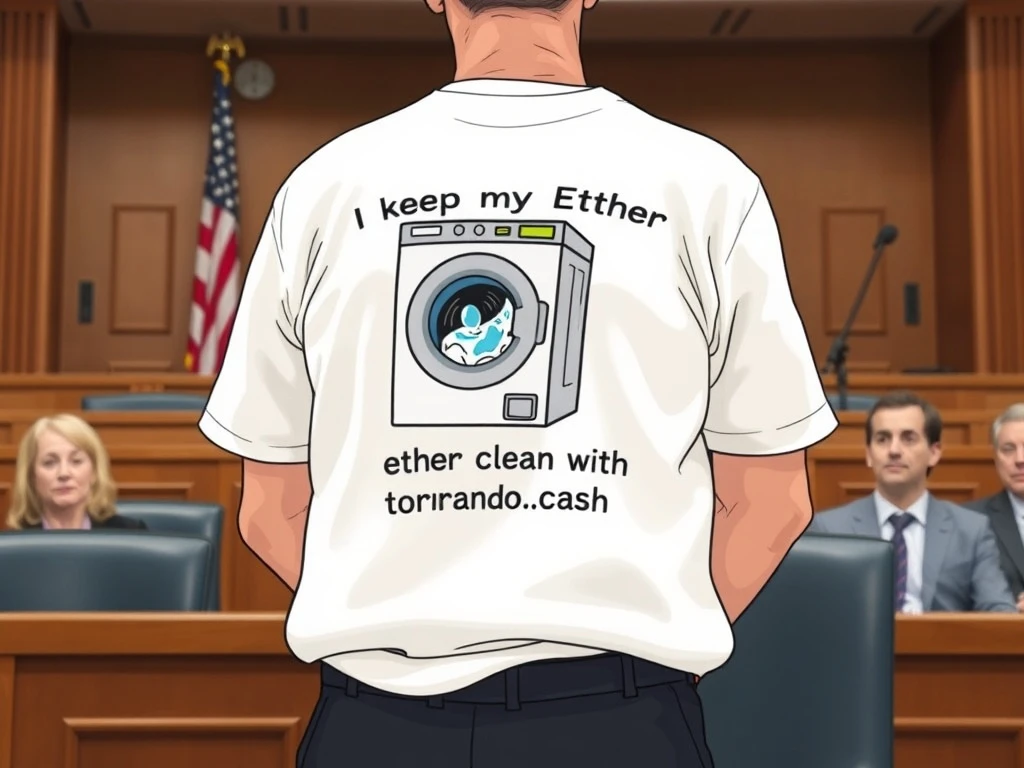Tornado Cash Trial Explodes Over T-Shirt Debate: Criminal Intent or Satire in Crypto Liability Case?

The Tornado Cash trial has taken a dramatic turn as a simple T-shirt becomes the center of a heated legal debate. Roman Storm, accused of developing the controversial cryptocurrency mixing service, faces charges of money laundering and sanctions violations. But it’s his 2019 T-shirt—featuring a cartoon washing machine and the phrase “I keep my Ether clean with Tornado.cash”—that’s stealing the spotlight. Is this proof of criminal intent, or just poor-taste satire? The answer could reshape crypto liability laws forever.
Tornado Cash Trial: A T-Shirt at the Heart of the Case
Prosecutors argue the T-shirt is damning evidence of Storm’s awareness of Tornado Cash’s role in laundering illicit funds. Assistant U.S. Attorney Kevin Mosley called it proof Storm was “profiting from a giant washing machine for dirty money.” The defense counters that it was merely a meme—a joke about the protocol’s controversial reputation in crypto circles.
Crypto Liability: Where Does Developer Responsibility End?
The case raises critical questions about accountability in decentralized finance:
- Can developers be held liable for how users misuse their software?
- Does maintaining a protocol after learning of criminal use demonstrate intent?
- How should courts interpret cultural references like memes in crypto cases?
The defense draws parallels to blaming banking app developers for financial scams—a comparison that could determine the trial’s outcome.
Money Laundering Allegations vs. Privacy Advocacy
Tornado Cash was designed to enhance transaction privacy on the blockchain, but prosecutors highlight its use in:
| Illicit Activity | Examples |
|---|---|
| Ransomware | North Korean hacking groups |
| Sanctions evasion | OFAC-blacklisted entities |
| Darknet markets | Drug trafficking proceeds |
The defense maintains these were unintended uses of open-source software.
What This Means for Blockchain Developers
The trial could set a precedent affecting:
- Legal standards for decentralized technology creators
- How courts interpret developer intent
- The future of privacy-focused crypto tools
With Storm choosing not to testify, the case may hinge on interpretations of that fateful T-shirt.
FAQs
Q: What charges does Roman Storm face?
A: Money laundering, conspiracy to operate an unlicensed money transmitter, and sanctions violations.
Q: Why is the T-shirt significant?
A: Prosecutors view it as evidence of criminal intent, while the defense claims it was satirical.
Q: What is Tornado Cash?
A: A cryptocurrency mixing service designed to obscure transaction trails on the blockchain.
Q: Could this case affect other crypto developers?
A: Yes, it may establish legal precedents about liability for open-source software creators.
Q: When was Tornado Cash created?
A: The protocol launched in 2019, with the controversial T-shirt appearing the same year.









